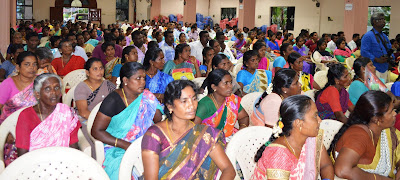 |
| Dr.K.Meena, Former,VC-BARD inaugurates the workshop |
K.Govindaraju,
Director SEVAI in his presidential speech in the inaugural session of three
days workshop on Micro Credit and Rural Development jointly organized by SEVAI,
Trichy, Gramium,Karur and Viswa Yuva Kendra, New Delhi in Trichy on Wednesday
mentioned “Although Microfinance in principle are helpful credit plus to poor women, at
the same time the interest rates charged by microfinance institutes are high
compared to that of traditional banks” K.Govindaraju further added “ Micro
finance Institutes are different from money lenders as there is confusion about
the difference between Money Lenders and Micro-Finance institutions. Money lenders should not collect exorbitant rate of
interest and should strictly comply with Tamilnadu Government Act regarding
money lending rates. Real Micro Finance Institutes should be legal and
transparent and books of accounts and the associated documents are to be open
for any official inspection and also the beneficiaries. Micro-finance
refers to supply of loans, savings and other financial services primarily to
the financially weaker section of the society. Women traditionally had less access
to financial alternatives of ordinary credit lines and incomes. Although Microfinance in principle are helpful to poor women, several borrowers
complain that the interest rates charged by a unregistered illegal money
lenders in disguise of microfinance institutes and these illegal money lenders
should not be allowed to function as most of the money lenders are collecting
unreasonable interest rates. The objective for MFIs should be to
improve the quality of life of the poor by providing access to financial and
support services to be a viable financial institution developing sustainable
communities and to mobilize resources in order to provide financial and support
services to the poor, particularly women, for viable productive income
generation enterprises enabling them to reduce their poverty and to create
opportunities for self-employment for the underprivileged. Microfinance is increasingly being considered as one
of the most effective tools of reducing poverty. Microfinance has a significant
role in bridging the gap between the formal financial institutions and the
rural poor. The Micro Finance Institutions (MFIs) accesses financial resources
from the Banks and other mainstream Financial Institutions and provide
financial and support services to the poor and these
loans may help families to cope with other kinds of economic challenges,
providing a way to manage their meager "cash flow." They can also use
the money from MFIs to do things like pay school fees and medical bills, and
sometimes just to buy food.” The workshop was inaugurated by Dr.K.Meena, Former Vice
Chancellor of Bharthidassan University in the esteemed presence of
Dr.P.Selvaraj, Shivani Group of Educational Institutions, Padmanaban, Field
Publicity officer and Suresh Kumar, AGM, NABARD.Earlier Gramium P.Narayanan
welcomed the gathering and Rajat Thomas of Viswa Yuva Kendra, New Delhi
proposed vote of thanks. Around 65 NGOs of Tamilnadu participate in the
workshop proceedings.-Kris





























